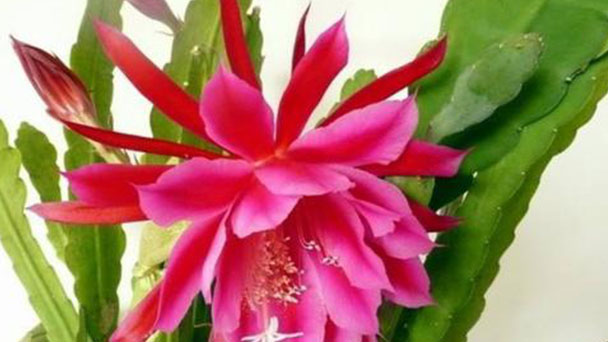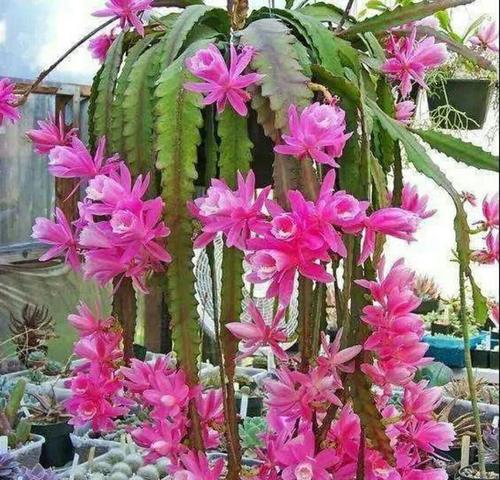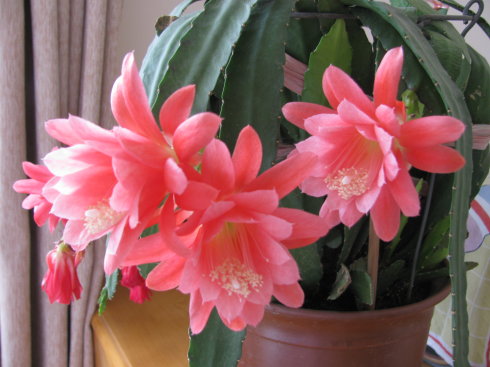How to grow and care for red orchid cactus
Written by Maggie
Sep 18 2021

Red Orchid cactus is a beautiful flowering plant. The four seasons of spring, summer, autumn and winter have different climate conditions, so there are different growing methods. Now, let’s look at how to grow and care for red orchid cactus.
Soil care for growing red orchid cactus
Red Orchid cactus likes fat, and is usually reported once every year in spring or autumn. When we grow and care for red orchid cactus, remove part of the old soil and withered roots, add the culture soil mixed by 4 parts of leaf rot soil, 3 parts of garden soil, 1 part of decomposed barnyard manure soil, 2 parts of sand soil, and put bone meal as base fertilizer.
Fertilizing care for growing red orchid cactus
Growing season every 15-20 days 1 times the decayed thin cake fertilizer water. When we grow and care for red orchid cactus after the Spring Festival, liquid fertilizer should be applied once every 10 days, and excessive side buds and branch buds germination from the base should be wiped away in time to reduce nutrient consumption and keep the plant shape neat and beautiful. Add 1-2 times of quick-acting phosphate fertilizer in the budding stage to promote big flowers and bright colors.
Water care for growing red orchid cactus
Water and loosen the soil after each fertilization. During the growth and development of watering to see dry see wet, must not basin water, otherwise easy root rot. The bud has been and is not open when watering can not be too much, otherwise easy to cause falling buds. When we grow and care for red orchid cactus in the dry and windy spring and hot summer, it is necessary to spray the metamorphosis stem with clear water frequently, and sprinkle water on the ground around the flowerpot to maintain high air humidity, which is conducive to growth and flowering.
Temperature care for growing red orchid cactus
Red Orchid cactus is not hardy to cold. In northern areas, you should enter the room before and after the Cold Dew Festival. After entering the room, put it in a sunny place. When we grow and care for red orchid cactus from winter to spring of the following year, the temperature should be kept at 10-15℃. If the temperature is too high, the abnormal stem is easy to grow empty and the plant shape is affected. Spring to summer, the temperature should be kept at 13-18℃, the temperature is too low, affects the bud. Winter should stop fertilizing, control watering, at this time basin soil moisture and low temperature, the most easy to cause root rot.
Growing red orchid cactus care for stems yellowing
Red Orchid cactus is prone to metamorphosis yellowing of its stem, and in severe cases, it may turn yellow or even burn its skin, which is often caused by improper placement of flower pots and direct exposure to strong light. Therefore, when we grow and care for red orchid cactus, the spring and autumn season can be placed in the outdoor light maintenance, and the summer must be placed in a well-ventilated half shade. Family cultivation, summer can also be placed in indoor scattered light of the place maintenance, but must pay attention to often open the window, so that air circulation. In addition, by red spider, scale insect harm, which will also cause abnormal stem yellow, should pay attention to timely prevention and control.
Growing red orchid cactus care for non-flowering
Plants only grow but not blossom, usually because of long-term shade and excessive nitrogen fertilizer, the nutrients are consumed on the long stem, which is not conducive to the result of flower bud differentiation. When we grow and care for red orchid cactus, stop applying nitrogen fertilizer, increase phosphorus, potassium fertilizer; Add light, but don't expose. In addition, many years of not changing the pot soil, resulting in high pH, soil alkaline, is not conducive to the formation of plant flower buds.

Spring care for growing red orchid cactus
Spring is the main growing season for Red Orchid cactus, which requires sufficient sunlight. When we grow and care for red orchid cactus, compound fertilizer can be applied once every two months. Be careful to avoid watering when watering. After spring, Red orchid cactus will bloom, and phosphate fertilizer can be applied to prevent poor flowering.And cut off the shoots that grow more.
Summer care for growing red orchid cactus
Red Orchid cactus thrives in the summer, but the plant goes into a semi-dormant state during high temperatures. When we grow and care for red orchid cactus in the summer, more nitrogen fertilizer should be applied to promote the growth of plants and provide more nutrients for flowering. In the summer, buds can be planted in time, or Red orchid cactus can increase the number of stems.
When we grow and care for Red orchid cactus in semi-dormant, it can be cured in a cool, ventilated place. Stop applying fertilizer and reduce watering, but be careful not to hide too much so that the plant does not grow unfertilized.
Autumn care for growing red orchid cactus
Autumn is actually the second time of the year when Red orchid cactus is growing more vigorously, when the new leaves are gradually aging.In the maintenance management, and the spring is similar. When we grow and care for red orchid cactus, we can carry out top dressing, more phosphorus and potash fertilizer. And to increase the time of light.
Winter care for growing red orchid cactus
Winter is a cold season, so keep warm when we grow and care for Red orchid cactus. Generally, Red Orchid cactus needs to be placed indoors for maintenance after Frost's Descent. Generally, it is a better choice to keep the temperature at about 8℃ indoors where there is sunshine. They also need to stop fertilizing, reduce watering, and keep the soil dry, which can lead to plant rot.After the temperature rises gradually, Windows can be opened for ventilation and maintenance.
Red orchid cactus propagation methods
Red Orchid cactus can be propagated by cutting or grafting.
Cuttage propagation should be carried out in spring every year. First cut 10cm long healthy flat stem as cuttings, cut after air 2-3 days, and then inserted into the wet sand or vermiculite, the depth of 1/3 of the cuttings as a degree, the temperature is maintained at 10-15℃, often spray water to it, generally 1 month can take root, and then can be potted.
Grafting propagation should be carried out at 25℃.Choose cactus stock. Cut a wedge on the stock with a knife, and then take 6-8 cm healthy Red Orchid Cactus stem slices as scion. Cut a knife on each side of the scion to expose the stem pitch and make the scion into a wedge.About 10 days grafting part can grow together, remove hemp skin, and can be normal maintenance.

Latest Updated
- Benefits of Bugleweed - 7 Science-backed Health Benefits
- Bugleweed Dangers & Side Effects - Is It Poisonous?
- How to Plant Evergreen Trees - What You Should Know
- When to Plant Evergreens - Grow Guide for Evergreen Trees
- 12 Wonderful Evergreen Shrubs for Your Garden
- 12 Popular Evergreen Plants with Pictures for Beginners
- When And How To Prune A Lilac Bush Like a Pro
- How to Grow & Care for Lilac Vine (Hardenbergia Violacea)
- Japanese Lilac Tree (Syringa Reticulata) Care & Propagation Guide
- Shumard Oak Pros and Cons - What to Know
Popular Articles
- Winter maintenance of Antirrhinum Majus
- How to Grow Terminalia Mantaly Tree
- How to Grow and Care for Crossostephium Chinense
- How to grow Antirrhinum Majus in spring
- Peristeria Elata (Dove Orchid) Profile: Info & Care Guide
- Underwatered Snake Plant (Sansevieria Trifasciata) - Signs And How To Fix
- How to Care for Brazilian Jasmine Plant (Mandevilla Sanderi)
- How to Grow & Care for Graptopetalum Purple Delight in Summer
- Rosa Chinensis (China Rose): Plant Growing & Care Tips
- How to Care for Baby Sun Rose (Aptenia Cordifolia)